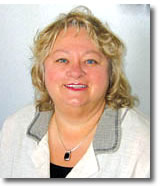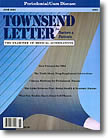Acupuncturist Finds Profession
More Than She Expected
In the early 80s, Patricia Culliton decided to
quit her job, travel to Asia and study Oriental Medicine. She had a
master's degree
in rehabilitation counseling, and she'd spent ten years as a
state mental health counselor in Colorado. Since she was interested
in Taoism and Buddhism, she thought Asian medicine would be a useful
adjunct to her counseling practice.
She had no idea she'd end up using acupuncture to treat back
pain and infertility, as well as mental problems. Or that she'd
become the head of an alternative medicine clinic affiliated with a
major academic center, with a $1 million annual budget, serving more
than 5,000 people a year.
 Using Acupuncture to Treat Addiction Using Acupuncture to Treat Addiction
In Asia, Culliton traveled in China, Japan and South Korea, studying
acupuncture and other aspects of Oriental Medicine. While she graduated
from a program in South Korea, most of her training was informal,
a one-on-one tutorial experience. When she returned to visit her
family in Minneapolis, she studied and practiced at a Chinese acupuncture
clinic there.
"I had a strong public health background, and I wanted to apply my acupuncture
skills to treat addiction and substance abuse," she says. "I
called all the mental health and addiction services, just calling places
endlessly until finally, Hennepin County, where I still work to this
day, let me in the door. Basically they said 'we'll do
a research pilot study and if it works then we'll talk about
developing clinical services.'"
The pilot study found that when chronic street alcoholics received
acupuncture they stayed sober longer, stayed out of detox longer, and
decreased government costs for treatment significantly. Two studies
were published in '87 and '89, and sparked the growth of
acupuncture in addiction programs in the United State and internationally.
But when the first study ended, the people who'd participated
had no place to go for continuing help. Culliton convinced hospital
administrators it would be only ethical to offer aftercare for study
participants. She recalls, "they probably thought, 'we'll
let her have a room for one hour a day, and see whether anyone shows
up.'" Study participants did show up, and they brought
their friends, their relatives, and other people off the street. Within
a month, Culliton had approval to expand the program and establish
a public health clinic to treat substance abusers.
Today, the public health aspect of her program treats about 1,000 people
a month. Licensed acupuncturists travel three times a week to residential
substance abuse treatment facilities, where they offer group-style
acupuncture for about an hour and a half. "We use ears as our
primary area of treatment, but we also do a lot of head and arm work," Culliton
says. "We consider acupuncture to be an adjunct service, to be
used together with conventional psychotherapy and supportive social
counseling. It's essential to deal with issues like housing and
jobs, and to have all these interventions working together."
Acupuncture Helps Infertility and Interstitial Cystitis Patients
Today Culliton is the director of the Alternative Medicine Division
at Hennepin Faculty Associates (HFA), a physician group which practices
at Hennepin County Medical Center, a large teaching hospital in Minneapolis.
The clinic started out very simply. "All the works of art on
the walls were pictures I took out of my house," Culliton recalls. "I'd
been doing research and offering clinical services for several years
when we were given an opportunity to establish the clinic. Since
I was already treating patients, our schedule was partly filled the
week we opened. Hospital administrators took a big risk when they
decided to establish the clinic, and they told us we had to break
even within the first few months. By the end of the first quarter,
we had done so."
The clinic offers many services in addition to acupuncture. It now
has 18 practitioners on staff offering seventeen modalities, including
herbal medicine, chiropractic, and several forms of massage therapy
and energy work. Clinic staff meet together once a week to discuss
their cases, but informal case consultations go on all the time. "The
staff share office space, with the desks all together in one large
room," Culliton says. "That's not an accident; it's
designed to encourage open discussions."
Culliton started out using acupuncture to help people deal with substance
abuse, but she soon began seeing people with back pain, headaches,
knee pain, and other common chronic musculoskeletal programs. "Since
Hennepin County Medical Center is the training hospital for the University
of Minnesota Medical School, there are lots of residents and medical
students. Whenever the residents came across an unusual case, and they
really didn't have anything to offer that patient, they'd
send them over to the acupuncture clinic! I started treating cases
where I had no idea whether acupuncture could be helpful."
Musculoskeletal problems continue to form a large part of the practice,
and nowadays many insurers cover acupuncture treatment for musculoskeletal
pain. The clinic has also had substantial success using acupuncture
for functional problems such as liver disease, infertility and bladder
disorders. Today about 25% of the clinic's patients present with
chronic functional problems, even though insurance doesn't cover
acupuncture for these conditions.
"Infertility has become a BIG area for us. We get referrals now from
OB-GYNs all around the city," Culliton says. "We treat
men with low sperm motility and women who've been told there's
only a 40% chance they'll ever get pregnant. We work hand-in-hand
with people who are actually getting in vitro fertilization, primarily
using Chinese medicine, as well as a fair amount of abdominal massage.
We've been very pleased with the results."
Culliton has also used acupuncture successfully for interstitial cystitis,
a chronic condition that causes frequent, urgent and painful urination. "When
I first started here, the wife of one of the hospital physicians had
it. I wasn't familiar with the Western medicine terminology,
and when he called me to discuss her case, I had to tell him I didn't
know what 'interstitial cystitis' was! But once he described
her symptoms, I told him acupuncture could be helpful in these cases," she
says. The hospital urology department had been following this patient,
and when she recovered, the chief of urology called Culliton to say, "I
can't believe your results!"
That was 19 years ago. Today Culliton sees a substantial caseload of
patients with interstitial cystitis, working closely with the urology
department. The clinic gathers outcomes data, and about 80% of the
interstitial cystitis cases report significant improvement in their
condition, she says.
Culliton and her co-workers have written numerous publications about
the utilization patterns and efficacy of acupuncture. The HFA Alternative
Medicine Division was the first academically affiliated CAM clinic
in the nation to be accredited by the Joint Commission for the Accreditation
of Healthcare Organizations (JCAHO). "When I was getting the
program started, and sometimes felt overwhelmed by obstacles, I used
to daydream that someday major institutions like the Mayo Clinic would
have CAM programs," Culliton says. "Now Harvard, Columbia
and the University of Arizona all have CAM programs. I'm consulting
with Mayo Clinic. It is a dream come true."

Elaine Zablocki is the editor of CHRF
News Files, a bimonthly emailed newsletter about the emerging
integrative medicine industry, published by the Collaboration for
Healthcare Renewal Foundation. |





